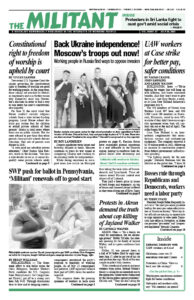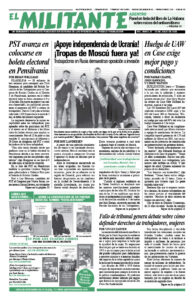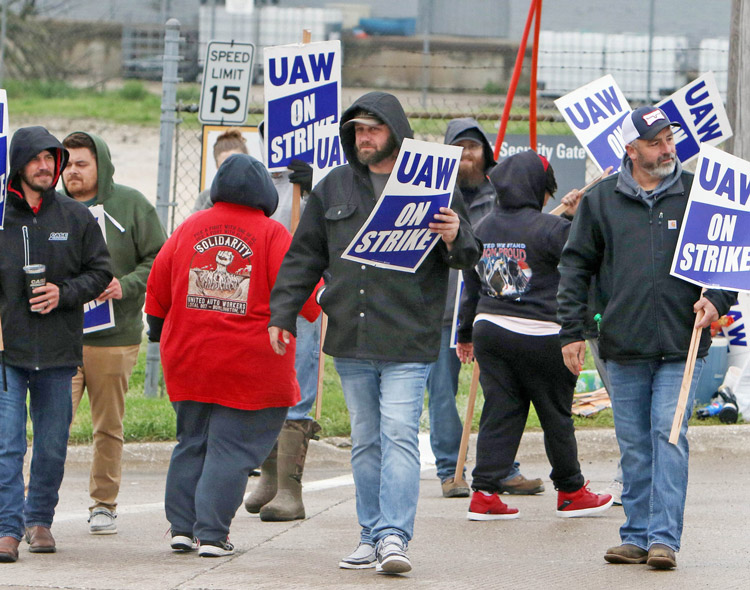BY NAOMI CRAINE,
JOHN HAWKINS,
AND LEROY WATSON
BURLINGTON, Iowa —“We’re fighting for wages that will keep up with inflation, and better retirement benefits. And they don’t want to give that to us,” said Gary Binder, a worker at Case New Holland Industrial’s plant here July 6.
The 430 members of United Auto Workers Local 807 here, and 600 UAW Local 180 members in Sturtevant, Wisconsin, voted by over 98% to strike if they didn’t have an acceptable agreement when their old contract ran out at the end of April. The strike began May 2.
Case New Holland is an international conglomerate that manufactures tractors and earthmoving equipment. The company reported a $1.76 billion profit in 2021, following an increase in construction projects from federal government infrastructure spending.
“I’m fighting mostly for the new people,” Deborah Beelman told the Militant on the picket line. “I have 26 years in. I get a traditional pension. The newer workers just get a 401(k). And there’s health insurance. They want to increase the deductible.
“The hours are outrageous,” she said. “They have mandatory overtime, 12-hour days. Like they want you to live in here. People have lives too.”
Beelman pointed out that the company hired dozens of new workers in the months before the contract expired. “A lot of them came out with us,” she said.
One of those is 23-year-old Deiontai Cummings. “I just finished three months on the job as an assembler before the strike,” she said. “It’s not easy finding a decent-paying job. I’ve got a 2-year-old son and one on the way. If we win what we’re asking for it will put me in a position to take care of my family.”
At the union hall here Local 807 President Nick Guernsey told the Militant, “Sixty-four percent of the workers at the two UAW-organized plants have less than five years’ seniority. The company was banking that they would cross the picket line or vote for a substandard contract. They banked wrong.”
At the Wisconsin plant, he said, “they don’t have temporary workers. We do here. So, we had to take the approach of winning them to the fight.
“We reached out to the temporary workers and urged them to join the union. And a good number of them did,” Guernsey said. “So, we’ve been paying those who joined the union and the strike and do their picket duty the same benefits that other members receive — $400 a week. And we’re going to keep our promise to fight to get them rehired once the strike is over.
“To counter company propaganda that we’re hiding the details of their offer from the membership,” Guernsey said, the union is making its proposals available to read in the union hall.
“Only 26 have crossed the picket line.”
He said the company increased its initial offer of a 3% wage increase to 8%. “But, with the company’s demand to increase medical insurance premiums and 401(k) costs,” he pointed out, “the end result, even with an 8% wage increase, would be a $1.96 an hour wage cut.”
According to Guernsey, the company is not producing as much as it claims. One measure of its weakening position is the work schedule bosses are trying to impose on scabs to increase production. The plant is going to a schedule of 12 hours Monday through Friday, 10 hours on Saturday, and eight hours on Sunday, he said.
Strike support at Wisconsin plant
The firmness of support for the strike among workers came through loud and clear when Leroy Watson and John Hawkins spoke with strikers in Sturtevant July 3.
Ken Hartog, a quality specialist with 25 years’ experience at the Wisconsin plant, was pulling his picket shift at the UAW Local 180 union hall. “We’ve had about 20 cross the picket line,” Hartog said. “When Wisconsin became a right-to-work state about a dozen years ago, 11 people left the union right away. So, of course, they crossed.
“The company is showing just what it thinks of them — they’re working them 72 hours a week! One of the guys just got fired for refusing to work those ridiculous hours,” he said.
“We’re telling people, ‘Before you cross that picket line, come talk to us and we’ll do what we can to help you.’
“The union made a smart move, raising the strike benefit to $400 a week. It allowed members to get a job during the strike and work an unlimited number of hours and still receive strike benefits, so long as they do their picket duty. Another smart move is paying for the health insurance, which Case cut off trying to pressure us back to work.”
“Right now, we’re not negotiating,” Local 180 Vice President Micah Tharpe said. “They’re trying to gauge how far we are willing to go. They signed a four-month contract with the scabs. So, they’re probably willing to go through the end of August.
“Morale among the strikers is good, in terms of the union. Not in terms of the company,” said Tharpe, who has 17 years at the plant, currently as a quality inspector. “Many workers are pretty angry. During the pandemic we were supposed to be essential workers, although the company did everything they could do get around CDC guidelines for masking and social distancing. Now they’re showing us they don’t care.
“One example says it all,” Tharpe said. “At their nonunion plants they start out assemblers at $26 to $27 an hour. At the union plants they start at a little over $20.”
Both locals have been receiving solidarity and donations from the surrounding communities and the labor movement.
Contributions can be dropped off at the UAW Local 180 union hall, 3323 Kearney Ave., Mount Pleasant, WI 53403. Messages of support and checks can be mailed to the same address. Messages can also be sent to president@uawlocal180.com.
Contributions can be dropped off at the Local 807 union hall, 9313 Koestner St., Burlington, IA 52601. Messages of support and checks can be mailed to the same address. Messages can also be sent to uawlocal807@qwestoffice.net.


